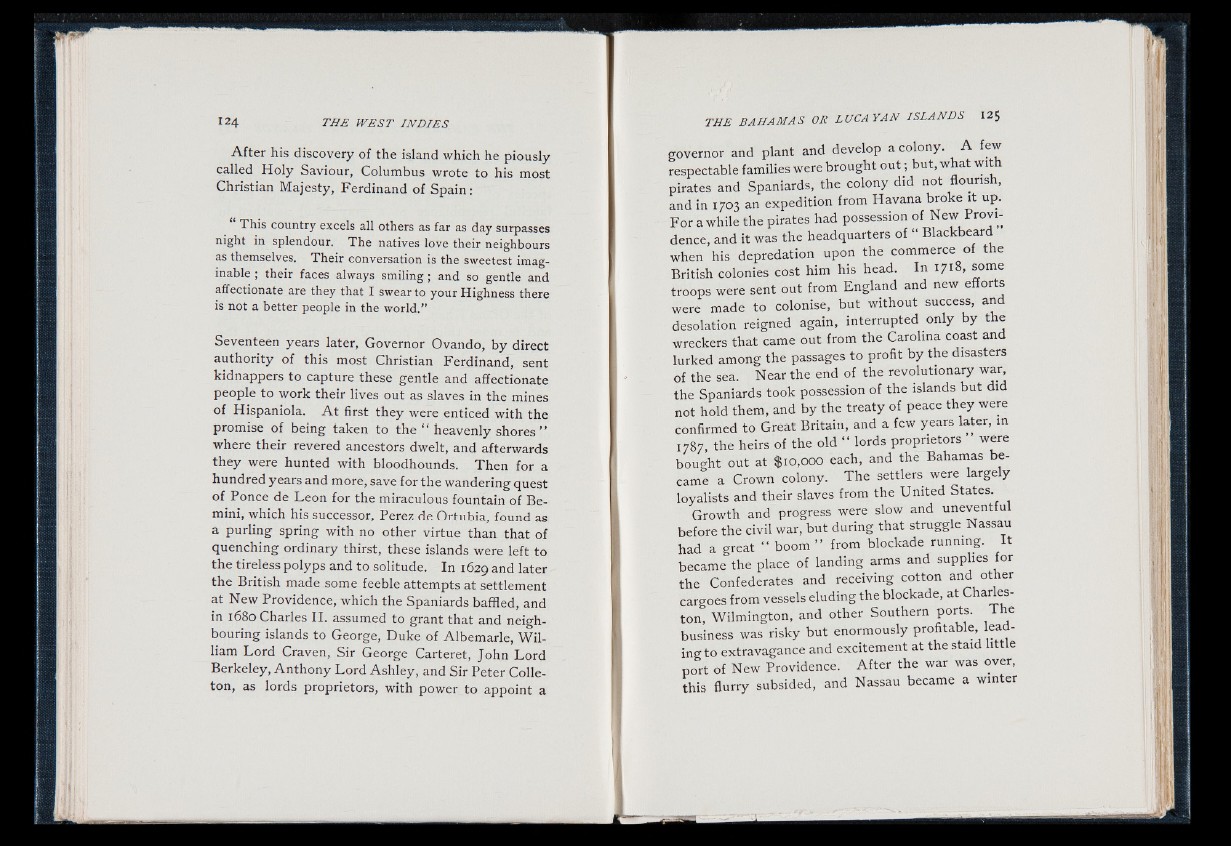
A fte r his discovery of the island which he piously
called Holy Saviour, Columbus wrote to his most
Christian Majesty, Ferdinand of Spain:
This country excels all others as far as day surpasses
night in splendour. The natives love their neighbours
as themselves. Their conversation is the sweetest imaginable
; their faces always smiling; and so gentle and
affectionate are they that I swear to your Highness there
is not a better people in the world.”
Seventeen years later, Governor Ovando, by direct
authority of this most Christian Ferdinand, sent
kidnappers to capture these gentle and affectionate
people to work their lives out as slaves in the mines
of Hispaniola. A t first they were enticed with the
promise of being taken to the “ heavenly shores”
where their revered ancestors dwelt, and afterwards
they were hunted with bloodhounds. Then for a
hundred years and more, save for the wandering quest
of Ponce de Leon for the miraculous fountain of Bernini,
which his successor, Perez de Ortubia, found as
a purling spring with no other virtue than that of
quenching ordinary thirst, these islands were left to
the tireless polyps and to solitude. In 1629 and later
the British made some feeble attempts at settlement
at New Providence, which the Spaniards baffled, and
in 1680 Charles II. assumed to grant that and neighbouring
islands to George, Duke of Albemarle, W illiam
Lord Craven, Sir George Carteret, John Lord
Berkeley, Anthony Lord Ashley, and Sir Peter Colleton,
as lords proprietors, with power to appoint a
governor and plant and develop a colony. A few
respectable families were brought o u t ; but, what with
pirates and Spaniards, the colony did not flourish,
and in 1703 an expedition from Havana broke it up.
For awhile the pirates had possession of New Providence,
and it was the headquarters of “ Blackbeard
when his depredation upon the commerce of the
British colonies cost him his head. In 1718, some
troops were sent out from England and new efforts
were made to colonise, but without success, and
desolation reigned again, interrupted only by the
wreckers that came out from the Carolina coast and
lurked among the passages to profit by the disasters
of the sea. Near the end of the revolutionary war,
the Spaniards took possession of the islands but did
not hold them, and by the treaty of peace they were
confirmed to Great Britain, and a few years later, in
1787, the heirs of the old | lords proprietors I were
bought out at $10,000 each, and the Bahamas became
a Crown colony. T h e settlers were largely
loyalists and their slaves from the United States.
Growth and progress were slow and uneventful
before the civil war, but during that struggle Nassau
had a great “ boom ” from blockade running. I t
became the place of landing arms and supplies for
the Confederates and receiving cotton and other
cargoes from vessels eluding the blockade, at Charleston,
Wilmington, and other Southern ports. T h e
business was risky but enormously profitable, leading
to extravagance and excitement at the staid little
port of New Providence. A fte r the war was over,
this flurry subsided, and Nassau became a winter